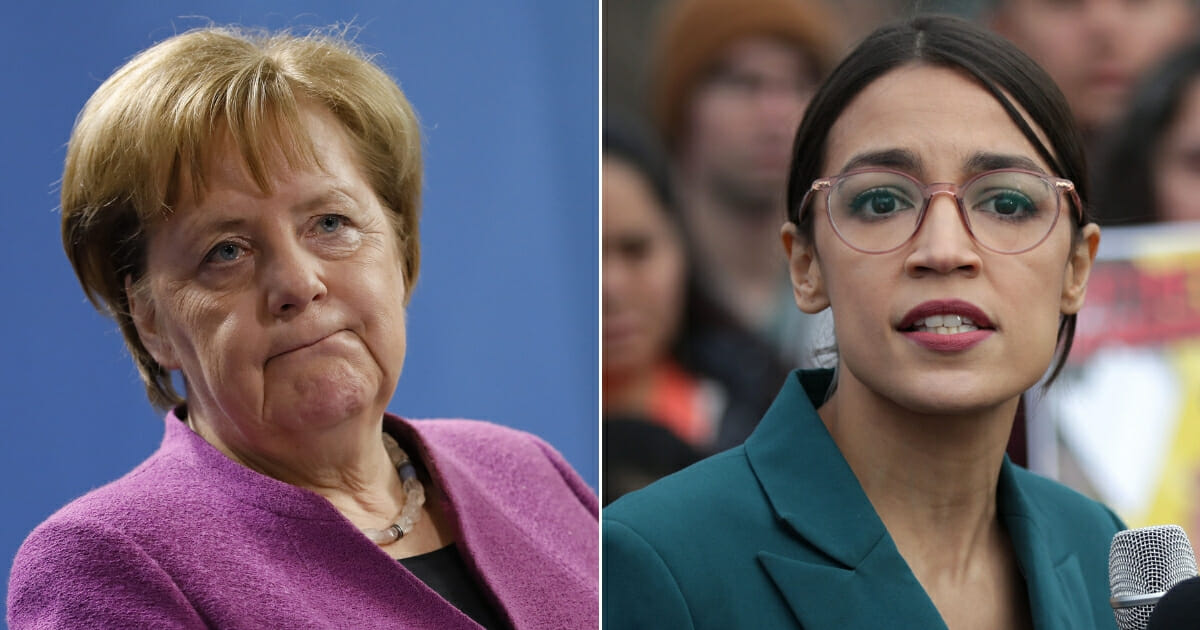
Germany Echoes Ocasio-Cortez in Killing the Coal Industry
Democratic Rep. Alexandria Ocasio-Cortez’s draft “Green New Deal” produced anger, confusion and outright laughter across the nation this week, effectively proposing to eradicate the health insurance, nuclear energy and fossil fuel industries overnight, in addition to providing “economic security” to those “unable or unwilling to work.”
While Ocasio-Cortez’s proposals cater to leftist, radical environmentalists, and are utterly ludicrous in an economic sense, causing even CNN’s Jake Tapper to balk at the $40 trillion price tag, it appears that other nations are leaping headfirst into similar proposals that invite economic destruction.
Germany grabbed headlines across the globe in late February by proposing a complete government ban on utilizing coal for energy by 2038, effectively signing the industry’s death warrant. President Donald Trump has repeatedly slammed Germany for the country’s immense trade surplus with the United States, however, if the German government continues to cave to the demands of green energy extremists, Berlin’s robust economy will be a thing of the past.
The German Coal Commission’s plan involves Germany phasing out coal as early as 2035, a timeline which a number of senior lawmakers have denounced as unrealistic. The proposal would see billions spent to help deal with the economic effects of such a dramatic shift, while the country’s power system will be forced to make a sharp turn to the left.
Moreover, as is often the case for ideologically-motivated policy, German taxpayers will be left footing the bill, sacrificing Germany’s future as an industrial powerhouse in the process.
Chancellor Angela Merkel has made the Energiewende, or energy transition, a key part of her legacy. The Wall Street Journal offered a particularly damning verdict on the coal commission’s proposal, referring to it as “the world’s dumbest energy policy” — which will heighten dependence on Russian gas, sap the country’s coffers, and yet barely make a dent in global coal consumption.
Simply put, phasing out coal and nuclear at the same time in a country of 82 million would be utterly disastrous.
According to the plan, taxpayers can expect to be hit with a 35 billion aid bill to four coal-dependent regions by 2028 as the country closes its last remaining 120 coal stations. The same stations, that is, that supplied more than a third of Germany’s electricity last year — and which neighboring France relies on to meet peak demand in winter.
By some reports, this aid is already a “definite underestimate” of what is actually required to support these soon-to-be-destitute swathes of German industry.
“The faster Germany pulls out of coal, the more expensive it’s going to be and we’re not talking about negligible costs,” says Lars Ruzic, spokesman of the IGBCE miners, chemical and electrical workers’ union, “the phase-out is an immense disruption for utilities, the coal regions, jobs and the broader economy.”
Worse still, Berlin’s entirely avoidable phase-out aid bill is just a side dish to the 500 billion already spent on switching off the lights at Germany’s biggest power plants, a move intrinsically tied to the fact that Germans are already paying more for electricity than anyone else in Europe. Most leaders would think this markup is bad enough, but Merkel’s plan to squash coal will likely cause price swings across the power, natural gas and carbon allowance markets.
Currently, coal still provides nearly 40 percent of Germany’s electricity. In comparison, even under the pro-coal Trump administration, the U.S. only gets 29 percent of its electricity from fossil fuel. The percentage is even lower in other Western nations — only 5 percent of the UK’s electricity comes from coal, for example. Berlin’s newfound vexation towards coal, then, sets the country up at a massive competitive disadvantage if Germany’s ambition is not matched by its peers.
Everyday German workers are likely to immediately feel the impact of the hasty coal exit. Parallels can be drawn to historic mining regions like West Virginia in the United States, which have had the rug pulled out from under them by politicians eager to baselessly crack down on the coal industry without offering up alternatives.
Likewise, Germany is full of regions which depend heavily on coal mining, with no other industries capable of absorbing the thousands of job losses heralded by hardline environmentalists. “Everyone has something to lose: industry, the regions, workers and the electricity producers themselves,” says Holger Lösch, deputy director-general of Germany’s BDI industry federation. “Who is going to pay for all this?”
Supporters of the measure don’t seem to grasp the impending economic fallout. Stefanie Langkamp from the Climate Alliance Germany network goes so far as to claim, “the coal phase-out should have been much more ambitious.”
Radical environmentalists like Langkamp may not yet have grasped the disastrous effects of the policy they are championing, but it seems Merkel, at least, is wizening up to the catastrophe. Speaking at the World Economic Forum meeting in Davos last month, the so-called “Climate Chancellor” herself admitted that “without being able to assure a baseload in our energy generation, we will not be able to survive.”
Ironically, less than two months ago, the German Environment Minister chastised Trump for claiming that the United States is saving trillions of dollars by pulling out of the Paris Agreement. She would be better off focusing on the billions her policies are likely to cost German workers.
Mitchell Gunter is a freelance journalist who has contributed hundreds of articles to publications including The Washington Times, The Federalist, The Daily Caller, The Daily Wire and The Foundation for Economic Education. His work on political issues in higher education has been featured on national programs including Fox Business, The Drudge Report and “Tucker Carlson Tonight.” Gunter holds a Bachelor’s of Science in Civil Engineering from Clemson University and lives in Greenville, South Carolina. He can be found on Twitter @rMitchellGunter.
The views expressed in this opinion article are those of their author and are not necessarily either shared or endorsed by the owners of this website. If you are interested in contributing an Op-Ed to The Western Journal, you can learn about our submission guidelines and process here.
Truth and Accuracy
We are committed to truth and accuracy in all of our journalism. Read our editorial standards.
Advertise with The Western Journal and reach millions of highly engaged readers, while supporting our work. Advertise Today.











